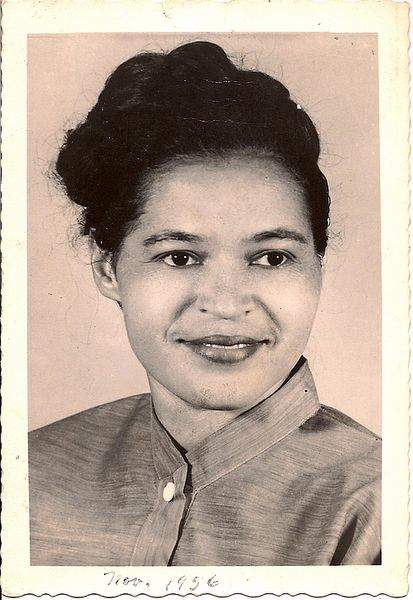by Michael Harris
Thursday, Feb. 04, 2010 at 9:05 AM
blackagriculture@yahoo.com
The early life of Rosa Parks shares a very common story of life in Black Farm communities throughout America, especially the Deep South. Today, the courage and faith of Rosa Parks is needed to close the final chapter of systemic racial discrimination with America's Last Plantation, the United States Departmento of Agriculture. Healthy Solutions are available by supporting, Black Agriculture in the 21st Century, focus on job creation, career development and creating sustainable communities, building on the legacy of a strong generation of elders and ancestors.

rosa_parks_1956.jpg, image/jpeg, 413x600
Rosa Parks Early Life & Childhood Early Years
On February 4, 1913, Rosa Louise McCauley was born in Tuskegee, Alabama to parents James McCauley and Leona Edwards. Her father was employed as a carpenter and her mother as a teacher.
In her younger years she was sick much of the time, and as a result, was a small child. Her parents eventually separated and her mother took her and her brother and moved to Pine Level, a town adjacent to Montgomery, Alabama.
There Rosa spent the rest of her childhood on her grandparents' farm.
Her childhood in Montgomery helped her to develop strong roots in the African Methodist Episcopal Church. Rosa did not attend a public school until the age of eleven. Before that, she was home schooled by her mother.
At age eleven she attended the Industrial School for Girls in Montgomery, where she took various vocational and academic courses. She began laboratory school for her secondary education, but never completed it because she was forced to drop out to care for her ailing grandmother.
Rosa's childhood was greatly influenced by the Jim Crow laws of the south, which segregated white people from black people in almost every part of their daily lives. This included public restrooms, drinking fountains, education and transportation.
For the children attending school, there was busing for the white children to their school, but the black children were required to walk to another school.
Public transportation followed this line of segregation except that blacks were allowed on the bus as long as they sat in the back, apart from the whites.
In her autobiography, Rosa recalls her grandfather standing at the front door of the farmhouse with a loaded shotgun in his hand while he watched as the Ku Klux Klan marched down their street. As frightening as this was to her as a little girl, it taught her much about the very real prejudices against blacks in American culture.
On the other hand, she also tells of the many white people who were kind to her and her family as she grew up. Although aware of the prejudices of most of the white people in the South, she refused to allow it to taint her attitude towards the goodness of mankind.
She attributes much of this to her strong faith in God and reliance on her church in times of tribulation.
In 1932 Rosa Louis McCauley became Mrs. Raymond Parks in a small ceremony performed at her mother's home in Montgomery, Alabama. Her husband, a Montgomery barber, encouraged Rosa to finish her high school classes and get her high school diploma, which she successfully accomplished in 1933.
Rosa joined her husband in their fight to raise money for the defense of the "Scottsboro Boys", a group of black men who had been falsely accused of raping two white women.
After many years of influence by her husband, who was already a member, Rosa joined the NAACP in 1943 and was made the secretary to its president, Edgar Nixon. Rosa's volunteer position for the NAACP lasted for 13 years.
In 1944, Rosa took a job working on the Maxwell Air Force Base. The air force base was considered a federally owned area and segregation was not allowed.
This was Rosa's first taste of a life of equality and was a turning point in her attitude towards civil rights. In Rosa's own words: "You might just say Maxwell opened my eyes up."
www.rosaparksfacts.com/rosa-parks-early-life-childhood.php

